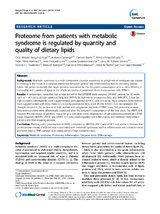Mostrar el registro sencillo del ítem
Proteome from patients with metabolic syndrome is regulated by quantity and quality of dietary lipids
| dc.contributor.author | Rangel Zúñiga, Oriol Alberto | |
| dc.contributor.author | Camargo García, A. | |
| dc.contributor.author | Marín, Carmen | |
| dc.contributor.author | Peña Orihuela, Judhit | |
| dc.contributor.author | Pérez-Martínez, Pablo | |
| dc.contributor.author | Delgado-Lista, Javier | |
| dc.contributor.author | González Guardia, Lorena | |
| dc.contributor.author | Yubero-Serrano, Elena M. | |
| dc.contributor.author | Tinahones, Francisco J. | |
| dc.contributor.author | Malagón, María M. | |
| dc.contributor.author | Pérez-Jiménez, Francisco | |
| dc.contributor.author | Roche, Helen M. | |
| dc.contributor.author | López-Miranda, José | |
| dc.date.accessioned | 2017-12-07T10:32:37Z | |
| dc.date.available | 2017-12-07T10:32:37Z | |
| dc.date.issued | 2015 | |
| dc.identifier.uri | http://hdl.handle.net/10396/15665 | |
| dc.description.abstract | Background: Metabolic syndrome is a multi-component disorder associated to a high risk of cardiovascular disease. Its etiology is the result of a complex interaction between genetic and environmental factors, including dietary habits. We aimed to identify the target proteins modulated by the long-term consumption of four diets differing in the quality and quantity of lipids in the whole proteome of peripheral blood mononuclear cells (PBMC). Results: A randomized, controlled trial conducted within the LIPGENE study assigned 24 MetS patients for 12 weeks each to 1 of 4 diets: a) high-saturated fatty acid (HSFA), b) high-monounsaturated fatty acid (HMUFA), c) low-fat, high-complex carbohydrate diets supplemented with placebo (LFHCC) and d) low-fat, high-complex carbohydrate diets supplemented with long chain (LC) n-3 polyunsaturated fatty acids (PUFA) (LFHCC n-3). We analyzed the changes induced in the proteome of both nuclear and cytoplasmic fractions of PBMC using 2-D proteomic analysis. Sixty-seven proteins were differentially expressed after the long-term consumption of the four diets. The HSFA diet induced the expression of proteins responding to oxidative stress, degradation of ubiquitinated proteins and DNA repair. However, HMUFA, LFHCC and LFHCC n-3 diets down-regulated pro-inflammatory and oxidative stress-related proteins and DNA repairing proteins. Conclusion: The long-term consumption of HSFA, compared to HMUFA, LFHCC and LFHCC n-3, seems to increase the cardiovascular disease (CVD) risk factors associated with metabolic syndrome, such as inflammation and oxidative stress, and seem lead to DNA damage as a consequence of high oxidative stress. | es_ES |
| dc.format.mimetype | application/pdf | es_ES |
| dc.language.iso | eng | es_ES |
| dc.publisher | BioMed Central | es_ES |
| dc.rights | https://creativecommons.org/licenses/by-nc-nd/4.0/ | es_ES |
| dc.source | BMC Genomics 16:509 (2015) | es_ES |
| dc.subject | Metabolic syndrome | es_ES |
| dc.subject | Proteomics | es_ES |
| dc.subject | Inflammation | es_ES |
| dc.subject | Oxidative stress | es_ES |
| dc.subject | DNA damage | es_ES |
| dc.title | Proteome from patients with metabolic syndrome is regulated by quantity and quality of dietary lipids | es_ES |
| dc.type | info:eu-repo/semantics/article | es_ES |
| dc.relation.publisherversion | http://dx.doi.org/10.1186/s12864-015-1725-8 | es_ES |
| dc.relation.projectID | Unión Europea. 505944 (LIPGENE) | es_ES |
| dc.relation.projectID | Gobierno de España. AGL2004-07907 | es_ES |
| dc.relation.projectID | Gobierno de España. AGL2006-01979 | es_ES |
| dc.relation.projectID | Gobierno de España. AGL2009-12270 | es_ES |
| dc.relation.projectID | Instituto de Salud Carlos III. CB06/03/0047 (CIBEROBN) | es_ES |
| dc.relation.projectID | Junta de Andalucía. P06-CTS-01425 | es_ES |
| dc.relation.projectID | Junta de Andalucía. CTS-03039 | es_ES |
| dc.relation.projectID | Junta de Andalucía. 06/128 | es_ES |
| dc.relation.projectID | Junta de Andalucía. 07/43 | es_ES |
| dc.relation.projectID | Junta de Andalucía. PI-0193 | es_ES |
| dc.rights.accessRights | info:eu-repo/semantics/openAccess | es_ES |

